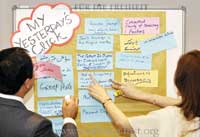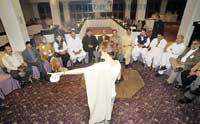 A two day seminar on ‘Democracy and Decentralisation’ was held by the Freedom Gate Pakistan in Holiday Inn, on the 29th and 30th of November. Freedom Gate is a network (not organisation) of the alumni of the International Academy of Leadership in Germany (IAF) and is funded by its partner, the Friedrich Naumann Foundation (FNF), a semi-Government German organisation.
A two day seminar on ‘Democracy and Decentralisation’ was held by the Freedom Gate Pakistan in Holiday Inn, on the 29th and 30th of November. Freedom Gate is a network (not organisation) of the alumni of the International Academy of Leadership in Germany (IAF) and is funded by its partner, the Friedrich Naumann Foundation (FNF), a semi-Government German organisation.
The school provides opportunity to international participants to discuss policy issues, access liberal positions and create platforms to discuss, deliberate and discover like-minded people.
The inaugural speech was given by Olaf Kellerhoff, the country representative of FNF in Pakistan. He started off with broken Urdu, but soon reverted to English for our convenience and gave a brief introduction of FNF. Jami Chandio, a member of Freedom Gate and an intellectual, gave us an introductory briefing.
Later, everyone was given a sheet of paper and requested to define democracy. The definitions that emerged were diverse but surprisingly correct, for example ‘collective wisdom’, ‘public voice’, ‘power of the people’ etc. Later, we discussed the external and internal factors that affect democracy were discussed. It was done by four groups; each group came with its own factors, threats and catalysts of democracy in Pakistan.
 It was heart-rending to see how insecure we have become. Very few points that emerged in this session were positive. The points pertaining to foreign powers were the most paranoid, especially India, US and even certain Muslim states.
It was heart-rending to see how insecure we have become. Very few points that emerged in this session were positive. The points pertaining to foreign powers were the most paranoid, especially India, US and even certain Muslim states.
The next day, Jami Chandio started by giving a quick recap. This was followed by a lecture on decentralisation and Pakistan’s constitutional history. Pakistan’s constitutional history was reviewed, with a focus on decentralisation laws. It was a little depressing, since Pakistan has been jostling with more or less the same issues for decades now. Almost all the military dictators have been anxious about devolving power. In the Musharraf era, a devolution plan materialised but much of the local government power was taken up by the centre.
At the end of every lecture, the participants were requested to sit in a randomly selected group and discuss the four aspects of an ideology. In this case it was ‘Democracy and Decentralisation’.
The final round was simulated talk show in favour and against local governments. Each participant played a different stakeholder in the show. This included a local businessman, MPA, Nazim, journalist, citizens etc. It was amusing to see how quickly we melt into the assigned role and start protecting our interests by hook or by crook. Like a typical T.V talk show, people started howling when not given a chance to speak. And the best scapegoat was the politician, who was accused of buying a new car just three months into office. Corruption and inefficiency were the main arguments against the local bodies. However, some participants commented that these problems are not unique to the local bodies but plague all social institutions in Pakistan.
The best aspect of this event was that barely any opinions was imposed. At the end of every lecture, which was usually brief, the participants were required to explore different dimensions of the issue together. The participants were a diverse group of politicians, professors, NGO workers, journalists and activists. Everyone had a different political leaning, some were even sitting MNAs and MPAs but from very different parties. There was often a consensus on ideas and how things ‘should’ be. The role of army, women, the poor masses and political parties were all examined and encouraged. However, there was no agreement on real historical events and current affairs, be it a former martial law dictator or corruption charges against party heads. Two minor problems in the interactive sessions were that people tended to become very emotional and generalised regularly. On the positive side, everyone was firm on ideological grounds that democracy is the best system possible and must sustain.
This piece was first published in The News.
No comments:
Post a Comment